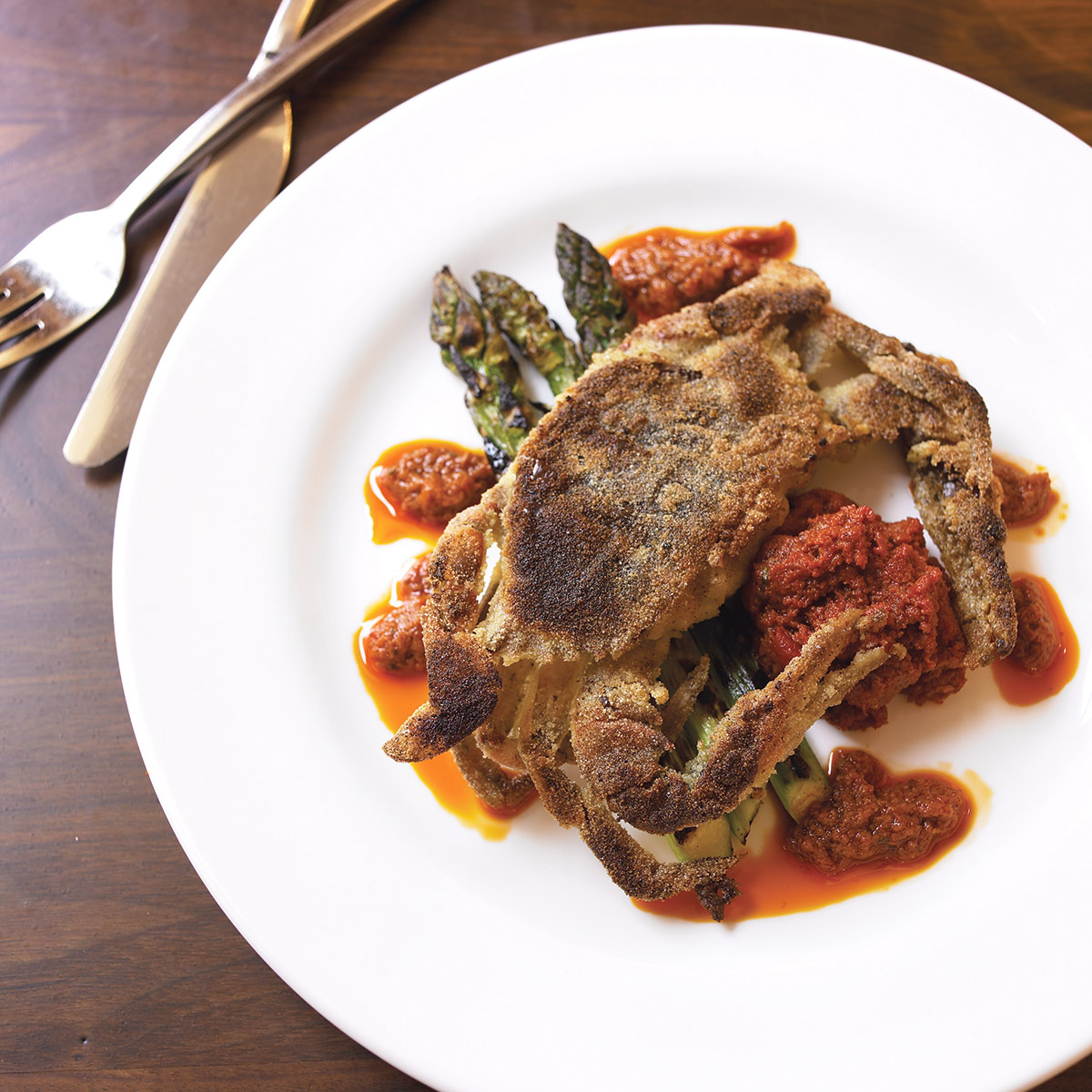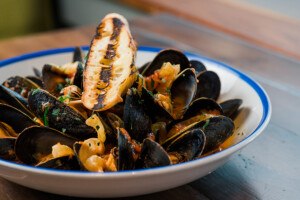Hits and Myths

Photo by Keller + Keller
Michael Leviton has a noble ambition. Two, actually. The first is not to lose lots of money pursuing a sweetheart real estate deal in Fort Point Channel, as who knows how many other enterprising chef-owners have done. The second is to create a restaurant on the order of San Francisco’s Zuni Café, one of my favorite places not just in the country, but in the world.
At first blush, Leviton doesn’t seem the obvious candidate. I’ve always found his restaurant Lumière, which brought fine cuisine to Newton, slightly starchy and, frankly, French. I’m in the minority, and I haven’t been there in a long time, but I never thought of Leviton—who has built a reputation as a champion of local ingredients—as being much in the Mediterranean swing, as Zuni firmly is, or being much interested in running a swinging place.
Persephone, Leviton’s new restaurant in the Fort Point neighborhood, certainly means to swing. It’s tucked inside a trendy clothing store, for starters. When Pava opened in Newton Centre two years ago, it was part of the fancy boutique Tess & Carlos, but it had its own entrance. Here, you have to enter through a store called Achilles and pass by tall cases in which clothes hang like art installations. Behind the cases is a lively bar with couches and intimate tables, and then comes the long brick hall that is the restaurant.
To get a foothold in Fort Point Channel, Leviton accepted the invitation of entrepreneurs Michael Krupp and Shaka Ramsay to establish a restaurant that would attract people from all over town to their retail-dining hybrid, the Achilles Project. No wonder Leviton took Zuni as his model: That café is the city’s crossroads, the place where a waiter getting off work comes for a drink and light meal at the bar and rubs elbows with the mayor, star chefs, and local style-setters.
Based on the three times I dined there, Persephone seems to be on its way to drawing a crowd like Zuni’s, the kind of people you find locally at the South End’s Butcher Shop. Certainly, foodies of note were present each time I went, as well as large parties that merrily—and loudly—filled the long tables that go down the middle of the room and give it the feel of a dining hall. A rowdy dining hall, that is, and one that an overworked staff has a fair bit of trouble keeping up with. On a Monday, servers were attentive, interested in us and the food; on a busy Wednesday, the too-few waiters frantically shuttled from table to table, interrupting orders and vanishing without explanation.
If the food at Persephone is to follow the Zuni model, it must be fresh, simple, reasonably priced, and strongly tied to local ingredients and Mediterranean traditions—and way better than you’d expect in a jammed place that stays open late. So far, Persephone is hitting a number of these targets while aiming for all of them. The fare is a touch pricey for the portion size, though, and uneven. And if there’s a money-in-the-bank dish to match Zuni’s legendary roast chicken with bread dressing, I didn’t find it.
The menu is divided into “small,” “medium,” “large,” and “extra-large” dishes. Many people would dicker with those terms, thinking the small dishes pretty darn small, the medium ones still smallish, and the large more like “normal.” But the extra-large dishes are indeed gargantuan—over the top, enough for two, and priced accordingly. Lucky for diners, the smaller the dish, the generally more successful it is, though you need to order a good number to make a meal.
Or opt for several rounds of the same dish, like one I had to order every time: duck egg en cocotte with sautéed mushrooms, grilled bread, and gremolata ($9). It’s easy to forget how seductive an egg can be. The stellar feature of a duck egg—its oversize golden yolk—nearly covered the surface of a wide ceramic baking dish and was ringed with squares of meaty “exotic” mushrooms (shiitake, trumpet royale, and hen-of-the-woods). A single scallop over peas “à la française” with lemon-butter sauce ($9) showcased the chef’s commitment to sparkling-fresh produce, the vivid green peas moist and sweet. My table fell in love with the dish and ordered two more (it’s a very small portion), but was a bit surprised that with each arrival, the peas seemed to get grayer and drier. Fava beans sprinkled over a salad of baby arugula ($11), along with almonds and shaved manchego, were similarly sparkling, though the allotment of oil and lemon dressing changed each time, from a spritz to a slick. Hearts-of-romaine salad ($12), really a caesar, was composed of long, uncut leaves slathered with a very garlicky anchovy dressing—good but excessive. The amount of oil on an expensive-but-worth-it plate of jamón ibérico ($22) varied greatly, too, but it didn’t matter: If you haven’t had this fabulously flavored, deep scarlet, beautifully marbled Spanish version of prosciutto, you owe it to yourself to splurge.
Leviton’s love of ingredients comes through often, and is mostly backed with his solid, classic technique. If the soft-shell crab ($15) is on the menu, try it: The semolina in the breading offers great crunch, and the grilled asparagus- with romesco (a Spanish red pepper and almond purée) makes for a vibrant seasonal plate.
The “large” dishes, for the most part, are less exciting. Grilled chicken with pine nuts, golden raisins, capers, arugula, and croutons ($24) is no Zuni chicken. It’s heavy on dullish white meat and light on sauce. The seared Gloucester halibut with more good mushrooms provides a bigger hit of flavor but is a small portion for $30, and the sesame-soy vinaigrette, though fine, is not much better than what you might come up with at home.
Both “extra-large” dishes we tried were extra-large disappointments. A huge hunk of roasted monkfish ($58) had underflavored, unpleasantly rubbery meat, though the sauce ravigote (a deconstructed take on tartar sauce) was well made and well chosen. A similarly enormous aged ribeye steak was fatty—yes, marbling is good, but I’m talking fatty—and just okay. And the price (which, like the clothes at Achilles, isn’t listed) turned out to be a colossal $84.
Desserts are uncertain, with the one sure thing being a flavor-packed ginger ice cream soda ($9) that’s refreshing, too.
The wine list is quirky and decently priced, and a number of those “small” plates are terrific (if small)—all good things for an urban bar. Stick with these, and the ice cream soda, and you’ll have a glimpse of why Leviton is one of Boston’s most respected cooks, and why foodies found their way to him fast. Meanwhile, I’ll be thinking about that duck egg and Spanish ham and waiting for the menu and the service to calm down and come into better focus—and, much as the owners doubtless hope it never will, for that opening heat and clamor to quiet down, too.


